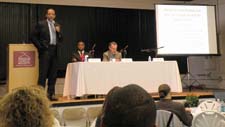November 23, 2011
 Education and public policy expert Dr. Ronald Ferguson discusses the state of urban education during the Freedom House’s Getting In, Getting Through, and Graduating conference.
Education and public policy expert Dr. Ronald Ferguson discusses the state of urban education during the Freedom House’s Getting In, Getting Through, and Graduating conference.
Parents, teachers, and education officials gathered at Dorchester’s Freedom House last Saturday to highlight challenges faced by urban school systems and celebrate a renewed effort to ensure public school students are given an opportunity to pursue higher education.
The “Getting in, getting through, and graduating” summit highlighted the changing needs of Boston Public School’s more than 4,000 high school seniors, half of whom apply for college but must often face a rigorous application process with little outside help. To that end, Boston’s three-year-old Success Boston college readiness program was a centerpiece of the meeting, focusing on its ongoing work to provide support to college bound students.
Massachusetts’ Secretary of Education Paul Reville opened the meeting by explaining that while students are largely thriving in the state’s current school systems, closing the achievement gaps that run along class and racial lines will require a new, “messier” approach to education that caters to the needs of individual students.
“We inherited an early 20th century system meant to mass process large numbers of students for low-skill, low-knowledge industrial jobs,” Reville said. “If we are going to survive and thrive as a society, we’re going to need a 21st century system that prepares everyone for success. All means all.”
For many in attendance, that messier solution is embodied by Success Boston, a partnership of six nonprofit programs that provide high school seniors with guidance during the application process, as well as job opportunities and continued mentorship as students make their way towards a diploma.
At the Freedom House, Success Boston operates through the PUSH (Preparing Urban Students for Success in Higher Education) program, which currently enrolls 27 college-focused students. The after-school initiative incorporates financial aid planning, application writing and a six-week intensive academic course held over the summer to ensure students are up to speed by the time they settle into their dorms.
PUSH program coordinator Rob Plummer said that while mentors continue to support students well into their college careers, the ultimate goal of Success Boston is to give young adults the confidence to address school administrators on their own behalf.
“[We want students] ultimately getting to the point of self reliance,” Plummer said. “That doesn’t come overnight, but it comes with experience, with our structure, guidance and support. We want kids to be knowing how to advocate for themselves, how to make the most of their college experience.”
According to Liliana Mickle, UMass-Boston’s special assistant to the school’s vice provost and Success Boston liasion, the program has vastly improved the school’s retention rate for students coming out of Boston public schools. Mickle credits the individual coaches who help students tackle problems both in and out of the classroom.
“I do believe the program is making a difference. It’s making a connection for students with people who are looking for their best interest,” Mickle said. “They can give guidance on life issues, academic issues, or even a particular experience they want to have in school like study abroad that they might otherwise miss.”
Mickle said that since the program launched, her office has seen a marked improvement in the cumulative GPAs and credit counts for students entering her school from the city’s public schools. Prior to Success Boston’s inception, she said, only about 26 percent of these students were on track to graduate in four years, compared to 41 percent in the 2010 academic year.
Manny Monteiro of Fields Corner, a UMass-Boston sophomore and a Push program member, said a similar high school-only program helped him make his way to a high school diploma and showed him the benefits of a support network.
“I had a support system which I feel was crucial to my academic life. If I hadn’t had support throughout my time in high school, I don’t know if I would be here today,” Monteiro said. “I knew I wanted something similar to that in college and when I was offered this opportunity, I thought ‘hey, this is it, this is the one for me.’”


